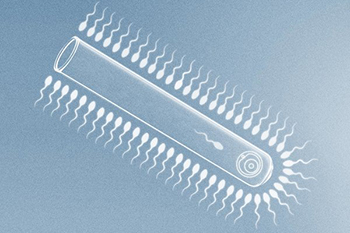(单词翻译:单击)

Dozens of sperm banks across the country recruit men to help them build up a supply of frozen sperm to meet the growing demand from women looking to start families.
为了满足希望建立家庭的女性日益增长的需求,全美各地的几十家精子库都在招募男性,帮助它们建立冻精供应。
It’s a big business. A vial of sperm can cost almost $1,000. But for the men, it’s probably not the quickest route to beer money. And it’s not simple.
这是一项大买卖。一小瓶精液的价钱可能接近1000美元(约合7000元人民币)。但对男性来说,这可能不是赚零花钱的最快途径。这件事并不简单。
Your odds of getting into Harvard or Stanford are higher than your chances of being accepted as a donor at the major sperm banks.
你上哈佛或斯坦福的几率,都比成为主要精子库捐精者的可能性要高。
California Cryobank and Fairfax Cryobank, the nation’s two largest sperm banks, take only about one in 100 applicants. Some deal-breakers: a low sperm count, an iffy health history or sperm that don’t do well after freezing.
在美国最大的两个精子库——加利福尼亚州精子冷库(California Cryobank)和费尔法克斯精子冷库(Fairfax Cryobank),申请者的通过率仅为百分之一。导致申请者被拒的一些因素包括:精子数量少、健康记录有问题或精子冷冻后表现不佳。
If you’re short, forget about it.
个子矮就算了吧。
Most sperm banks aren’t interested in white donors who aren’t at least 5 feet 9 inches, because most of their clients don’t want them. But the bar is lower for members of ethnic groups that tend to be shorter. And given a perpetual lack of African-American donors, height may not be a disqualifier for black donors.
绝大部分精子库都对身高不足5英尺9英寸(约合175厘米)的白人捐精者不感兴趣,因为大部分客户都不想要这些人的精子。但对身高往往较矮的其他族裔成员,门槛会低一些。此外,考虑到一直缺乏非裔黑人捐献者,黑人大概不会因为身高问题而被取消资格。
Your love life may take a hit.
爱情生活可能会受影响。
Keeping your sperm count high enough to make the grade means at least two — more often three — days of abstinence before each donation. And donors are expected to produce a good specimen once or twice a week, leaving not much time for sex between visits.
为了达到标准,必须保持精子数量足够高,这意味着每次捐精前,至少需要禁欲两天——往往需要三天以上。并且捐献者被要求一周提供一次或两次的上乘样本,因此这个间歇期并没为你的性生活留太多时间。
You won’t get a quick paycheck.
不会很快拿到报酬。
To prevent the spread of HIV and other diseases, the Food and Drug Administration requires that sperm be frozen for six months, and the donor retested, before it can be used. Sperm banks won’t pay until your sperm is ready for sale and you are added to the donor catalog.
为了防止艾滋病毒(HIV)和其他疾病的传播,美国食品与药品管理局(Food and Drug Administration)要求精子在使用前须冷冻六个月,且捐献者须再次接受检查。在准备出售你的精子并将你加入捐献者名录之前,精子库是不会付钱的。
You’ll fill out lots of forms and have lots of tests.
得填不少表格,做不少测试。
There will be many questions about your sexual history, drug use, goals, hobbies, talents and recent travel (to rule out Zika exposure).
问卷涉及很多问题,包括性生活史、药物使用状况、人生目标,兴趣爱好、各种特长,以及最近旅游地(为了排除兹卡病毒)。
You will undergo physical, psychological, personality and S.T.D. screening, and give blood, urine and (uncompensated) semen samples.
得做体检、心理测试、性格测试和性病筛查,要提供血样、尿样和精子样本(无偿)。
Your every physical feature will be scrutinized, and you may be asked to provide a childhood or adult photo and write an essay, or tape an interview, to be shared with potential buyers.
你身上的每一种身体特征都会经过仔细检查,可能还会被要求提供一张童年时代的照片或成人时的照片,并被要求写一篇文章或录制一段访谈,供潜在的买家分享。
There will also be genetic testing, the extent of which depends on your ethnicity:
还会有基因测试,范围取决于你的种族。
Ashkenazi Jews are tested for by far the greatest number of genetic diseases.
目前,阿什肯纳兹犹太人(Ashkenazi Jews)需要检查的基因疾病种类远超其他族群。
Some sperm banks tout all that free testing as a benefit of becoming a donor.
有些精子库会将这些免费测试作为一种福利,以此招募捐精者。
Your pay will depend on how often you donate, and how many vials — usually two or three — the sperm bank can fill from each donation.
报酬取决于捐精频率,以及每次捐献的精液能装满几瓶(通常是二到三瓶)。
Compensation varies, but an active donor who produces specimens twice a week might make $1,500 a month.
报酬标准不一,不过每周提供两次精子的活跃捐献者大致能获得每月1500美元的报酬
(For buyers, the price per vial ranges from $500 to $900 if the sperm is to be used for intrauterine or intracervical insemination.
(如果购买者使用宫腔内人工授精或宫颈内人工授精,购买价格在每瓶500美元到900美元。
If the bank also sells sperm for in vitro fertilization, which requires less processing but has a lower success rate, the price is lower.).
如果精子库也向所需程序较少但成功率较低的体外人工受精提供精子,那么售价会低一些)。
You can’t wait for the mood to strike you.
不能等情绪来了才捐。
Being a sperm donor is not a weekend hobby.
捐精可不是什么周末业余爱好。
Donations generallyhave to be made during business hours — at some sperm banks, shortened business hours — Monday through Friday.
捐献通常必须在办公时间进行,也就是周一到周五,某些精子库的办公时间还是缩短的。
And of course, you have to live near one of the sperm bank’s offices.
当然,你的住处得离某个精子库办公室不远。
Between them, California Cryobank and Fairfax Cryobank have offices in 10 cities, and there are dozens of smaller operations across the country.
加利福尼亚冷库和费尔法克斯冷库共在十个城市里开设了办公室,在全国各地还有几十家较小的类似企业。
You have to make a long-term commitment.
需要长期承诺。
Because they invest about $2,000 per donor in the recruitment and screening process, most sperm banks ask for an agreement that you will donate at least once a week for six months to a year —a lot of sessions in a small room with a modest supply of pornography.
精子库在每位捐献者身上都要投入2000美元左右的招募和筛查费用,大多数精子库会同捐献者签署协议,要求承诺六个月到一年内每周至少捐献一次——过程就是在一个小屋子里,面对不多的色情制品,这样的事情要完成很多次。
And you can expect periodic health checkups.
而且还需要定期进行健康检查。
You’ll never know how many children you have fathered.
永远不知道自己究竟会有多少子女。
There’s no legal limit, but the biggest sperm banks have policies that one donor’s sperm will not be allowed to sire children for more than 25 to 30 different family units.
这方面没有法律限制,但是最大的几家精子库都有相关政策,同一个捐献者的精子不能用于25到30个以上不同的家庭单元。
But some families may have two or three children with the donor’s sperm, and others may not report a birth, so they would not be counted in that limit.
但是某些家庭可能使用同一位捐献者的精子生出两三个孩子,也有些家庭不会上报生育情况,因此就不会被计入限制之中。
Some men who have joined the Donor Sibling Registry, a site where donors and their children can connect, have been surprised and disturbed to discover that they have dozens of offspring.
有些男性登录帮助捐精者和子女取得联系的捐精亲属登记( Donor Sibling Registry)网站后,惊讶且不安地发现自己有了百八十个后代。
You may or may not get to meet them.
不一定与子女相见。
Sperm donors usually have the option to remain anonymous, or to agree that the children can get in touch when they turn 18.
精子捐献者通常有权利选择匿名,也可以允许子女年满18岁后和自己取得联系。
There has been a growing recognition of children’s rights to know their genetic parents — and recently a trend toward donor willingness to be identified.
目前社会愈来愈倾向于认可子女有权知道自己基因意义上的双亲——近来捐献者愿意留下真实身份的趋势也在增加。
Even anonymous donors are increasingly being identified by curious children as genetic testing becomes cheaper and more common.
随着基因检测愈来愈便宜和普及,就连匿名捐献者也愈来愈有可能被好奇的子女们发现。


